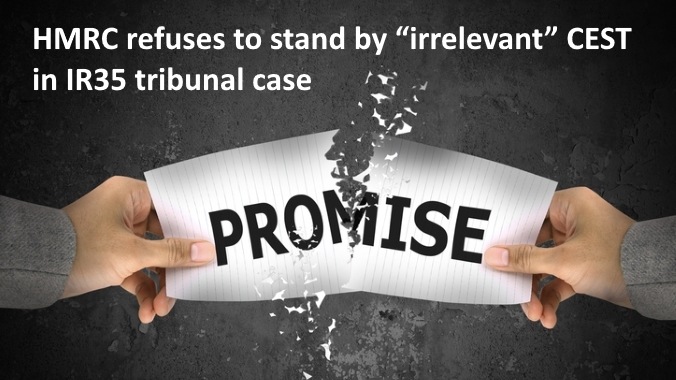HMRC has failed in a bid to have evidence derived from its Check Employment Status for Tax (CEST) tool omitted from consideration in an ongoing IR35 tribunal case.
In the case of RALC Consulting Ltd v HMRC, the taxman’s legal representatives contested IT contractor Richard Alcock’s use of detailed analysis of a CEST assessment as evidence. The CEST assessment had determined that IR35 should not apply.
In its application to dismiss the witness evidence, HMRC argued: “The form, content and application of CEST to the appellant’s arrangements is irrelevant to the issues to be determined by the tribunal; namely whether the hypothetical contracts between Mr Alcock and the clients would have been contracts of service.”
This latest revelation will raise further doubts over the certainty that an ‘outside IR35’ CEST assessment can provide, with HMRC’s actions appearing to be inconsistent with its vow to stand by CEST determinations where questions have been answered accurately.
HMRC brands CEST “irrelevant” in tribunal challenge
HMRC applied to exclude various evidence put forward by RALC Consulting Ltd, including a witness statement from ContractorCalculator CEO Dave Chaplin. Chaplin had previously spent two days examining relevant documents to determine how CEST’s questions should be answered in accordance with Alcock’s working arrangements, which concluded with a determination of ‘IR35 does not apply’.
While the taxman’s challenge to Chaplin’s involvement as a witness succeeded (because he was not an expert witness pre-agreed by both parties, nor a witness of fact), Judge Jennifer Dean refused to exclude use of his analysis as evidence by the appellant, acknowledging the methodology and analysis carried out by Mr Chaplin may assist the tribunal. As a result, the analysis will remain in the tribunal bundle and is open to the appellant to utilise in the collation of the evidence and application of it to the legislation and case law principles.
This decision came in spite of opposition to any use of evidence derived from CEST from HMRC’s legal counsel, which submitted that the tool was “of no assistance to the tribunal in determining the issue”.
As well as branding the application of CEST “irrelevant”, HMRC added: “While CEST can be helpful in providing guidance, it is only the application of the legislation and relevant case law to the hypothetical facts that must be considered by the tribunal.”
“It is disappointing that HMRC attempted to have the CEST analysis excluded as evidence. Even more so that it hasn’t conducted a detailed assessment itself to agree what the correct CEST determination should be,” comments Chaplin. “The taxman appears to be acting in bad faith. CEST was supposed to offer certainty to taxpayers, yet HMRC is removing this by ignoring its own tool.”
CEST assessment disregarded by HMRC during internal review
This isn’t the first time HMRC has disregarded CEST in its pursuit of Alcock, having already omitted the findings of a CEST assessment from its own internal review.
RALC Consulting Ltd had made representations to HMRC indicating that CEST had been retrospectively utilised, concluding that IR35 didn’t apply to its engagements. However, while acknowledging HMRC’s pledge to stand by the results issued by CEST, a review conclusion letter issued by the taxman argued:
‘The tool only provides a conclusive result if based on the correct information. On reflection of the evidence I have seen, I do not agree with this position. The conclusion of the review must focus on the evidence presented and the applicability of the relevant law.’
Notable is the fact that, while HMRC disagreed with the answers entered into CEST, it failed to elaborate on which answers it disagreed with, and why. Though disappointing, for Chaplin, HMRC’s response wasn’t unexpected:
“When HMRC first came out and said it would stand by CEST providing accurate information had been entered, everybody assumed the taxman would use this caveat as an excuse to challenge any decision it sees fit, without proper justification. This is just another example confirming those suspicions. HMRC evidently has no issue disregarding CEST’s findings when the circumstances suit.”
What does this mean for contractors and HMRC?
Unfortunately for contractors, the taxman’s latest legal challenge demonstrates that very little certainty can be attached to an ‘outside IR35’ CEST assessment. Online guidance accompanying CEST states that ‘HMRC will stand by the result given unless a compliance check finds the information provided isn’t accurate’.
However, in spite of two assessments being undertaken – both of which firmly concluded that IR35 didn’t apply – there is no evidence to suggest that HMRC conducted a compliance check to conclude otherwise.
The taxman’s readiness to attempt to have CEST-based evidence removed from court is particularly disturbing for contractors, who could easily find themselves subject to challenges from HMRC having acted in accordance with its wishes.
“This shows that anyone conducting assessments should ensure that they are using an insurance-backed service,” notes Chaplin. “This way, in the event that HMRC disagrees with an assessment and proceeds to tribunal, the defence costs are covered.”
Meanwhile, the decision to challenge evidence derived from CEST on the basis that it is “irrelevant” risks leaving HMRC in a tricky predicament, as Chaplin highlights:
“If, as we expect, the contractor wins his appeal, HMRC will have wasted more public money contesting the IR35 status of an individual who CEST accurately assessed. If HMRC maintains its stance that CEST was answered incorrectly and should have returned a different outcome in this case, it would mean that CEST was wrong. Either way, HMRC has acted inconsistently and will surely be subject to just scrutiny.”
The substantive appeal involves the preliminary issue which is that HMRC assessments are time barred and this, together with the substantive IR35 appeal, will be heard in September 2019.

